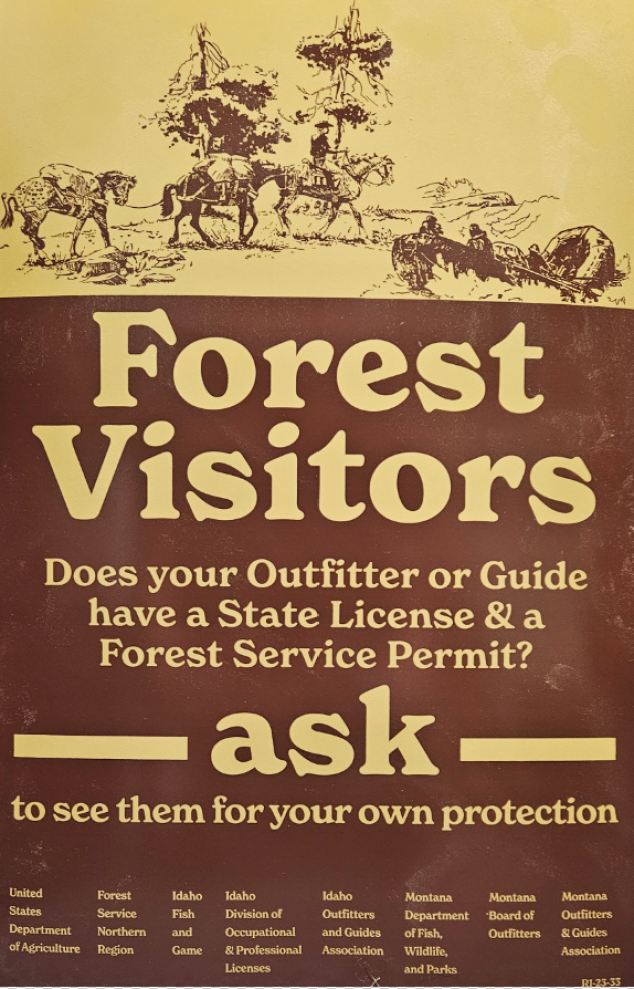Code of Ethics
Outfitters and Guides Code of Ethics
- The outfitter and guide will utilize his knowledge and skill for the benefit of the public and the profession he services. He will cooperatively strive to extend the public knowledge and appreciation of his profession.
- He shall advertise only in a dignified manner, setting forth a factual presentation of the services he is prepared to render for his prospective clients or the public and the cost of such services.
- If he has the responsibility to furnish boats, stock or other equipment, the equipment furnished shall be safely maintained, operated and handled; the stock in such a situation conditioned to the job at hand. He shall maintain adequate sanitary service facilities and serve clean, wholesome food; both services to be conditioned only by the primitiveness of the surroundings.
- He shall be licensed and bonded as an outfitter and guide by the State of Idaho and shall adhere to the laws and regulations, Federal and State, which govern the profession.
- He will support the fish and game laws and will be fully able to use approved methods in the care of wildlife meat and trophies. He shall protect the fields and forests from the ravages of wild fire and support the conservation of natural resources.
- The outfitter and guide will be loyal to his client or employer and perform his job to the best of his ability at all times.
- He shall respect the rights of other outfitters and guides and shall not, without just cause, directly or indirectly, injure their reputation or business. He will refrain from expressing publicly opinions in regard to his associates or on allied technical subjects, unless he is informed as o facts relating thereto.
- He will guard his profession against the admission to its ranks of persons unqualified because of their lack of good moral character or who are, because of inadequate training, unable to perform as a professional.
- He will cooperate in extending training opportunities to others through an interchange of ideas and experiences and by seeking other means to assure the longevity of the profession.
- The outfitter and guide shall direct his best efforts towards the fulfillment of his contractual obligations, but he shall do nothing that will infringe on the rights of his guest or the cause of good sportsmanship.
- He shall practice appropriate minimum-impact camping techniques, and he shall cooperate with other outfitters and guides and agency personnel to continue to develop better methods of caring for the lands and waters upon which he outfits and guides

Is your Outfitter/ Guide Licensed?
As early as 1951, persons providing horses for hunting and fishing or assisting others in taking fish and game on a commercial basis were required to obtain annual licenses from the Idaho Fish and Game Department. However, the department was not provided rule making authority. Therefore, any applicant of “good moral character” who paid the license fee and posted a bond was licensed. This occurred a decade before the Forest Service began similar regulation of outfitting and guiding.
The Idaho Outfitters and Guides Board, later renamed the Idaho Outfitters and Guides Licensing Board (IOGLB), was created in 1961 by the legislature with the support of the IOGA. The IOGLB is responsible for the health, safety and welfare of those who utilize outfitted services.
The IOGLB is a self-governing state agency and is recognized throughout the nation as one of the most comprehensive licensing programs in existence. Idaho was the first state to license outfitters and guides with a bonding requirement for outfitters. An outfitter is someone who offers guided trips for compensation. A guide is an outfitter's employee. Guides must be certified in first aid. They must train with a licensed outfitter, and they must be licensed with the state board. To operate legally in Idaho, outfitters and guides must be licensed with the IOGLB.
